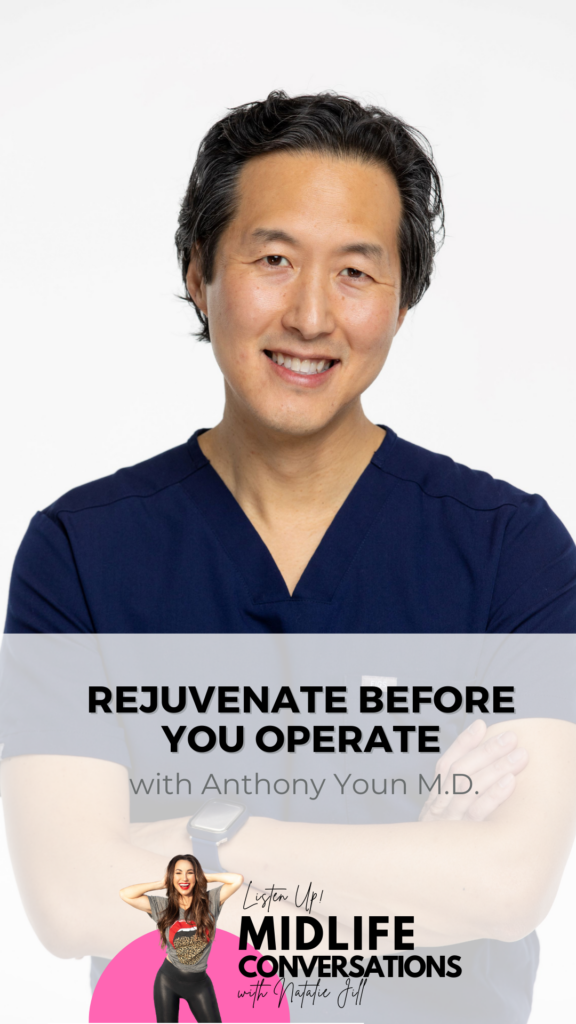23 Jan Rejuvenate Before You Operate with Dr. Anthony Youn
Certain conditions of course can only be treated surgically. However, with technology, nutrition, and supplements, there is SO MUCH we can do short of surgery to help us feel and look good on the inside and outside!
Skin Changes in Midlife
I happen to be the age where tanning beds were THE thing in our teens and twenties and I feel like the skin changes that are coming with aging are some of the biggest changes I see! But the GOOD NEWS is that Dr. Youn said this is the easiest and least invasive part of aging we have control over and when addressed, you can see changes in as little as three weeks!
There Are 4 Main Causes of Skin Aging:
- Collagen Degradation. We lose about 1% per year of the thickness of our collagen starting at the age of 25. This increases to 2% per year once a woman goes through menopause
- Inflammation
- Oxidation (free radical production)
- Loss of autophagy (intracellular renewal/regeneration)
By focusing on these four things you can not only prevent more rapid aging but you can REVERSE some of the skin aging already taking place and will see major changes in your skin!

How to Replenish Collagen in Your Skin
Collagen is really important. Collagen is the most abundant protein in your body and is the primary building block of your body’s skin (our skin is about 70% collagen and 30% elastin), muscles, bones, tendons, ligaments, connective tissues etc. and is also essential to your organs, intestinal lining, and your blood vessels! If you’re not getting sufficient protein, your body is not going to be able to produce collagen.
Traditionally, most people’s diets are low on protein…so one best tip for repairing collagen is to eat a lot of protein rich foods! There have been studies that show that taking a hydrolyzed collagen supplement increases the thickness of your skin’s collagen (which can also mean wrinkles, skin elasticity, and hydration). One of MY favorite tips for increasing your collagen is drinking bone broth!
In addition to getting enough collagen through diet, you can also use topicals to help thicken your skin’s collagen. The number one ingredient to look for is retinoids. Retinoids are derivatives of Vitamin A. If your skin is too sensitive for retinoids, look for something with bakuchiol.
IF you’re someone who is concerned about the potential exposure to toxins from retinoids, you can start with a brightening cream that contains either niacinamide, Kojic acid, or licorice root extract. Those are three popular and effective ways to reduce pigmentation. If possible, combine that type of cream with a treatment like IPL (a light-based treatment).
Dr. Youn’s pro tip: Do not waste your money on collagen CREAMS. They don’t work! They just sit on the surface of your skin.
Inflammation vs. Oxidation and Free Radicals
Free radicals are a byproduct of being alive. But, you can get attacked by more free radicals than your body can handle (pollution, processed foods, smoking, environmental exposures, bad/rancid oils, etc.). This is known as oxidation. Free radicals are unstable molecules that need extra electrons, which they often steal from healthy cells. This can lead to overall aging of the entire body, and is the process that makes antioxidants so popular. Antioxidants work by donating electrons to free radicals to neutralize them and stop them from being so harmful to the body.
Inflammation can be acute or chronic. Acute inflammation can be a good thing (like retinol or laser or microneedling, etc.) for skin. But when inflammation is chronic, it becomes a major issue. What causes chronic inflammation? Sugar!
Sugar is bad for our skin and collagen in two main ways:
- Glycation. Sugar can bond with the damaged collagen and elastin and create something called A.G.E.’s. These A.G.E’s are also introduced to our bodies from high fat foods, especially when they are overheated (like eating bacon which is apparently really high in A.G.E.’s!). These A.G.E.’s cause inflammation in our body and our skin which damages our collagen.
- Insulin Spikes. Eating a lot of sugar or sugar too often can cause a whole host of insulin related issues…which cause a whole lot of other issues! If you’ve been following the podcast and blog you are no stranger to these.
Pro tip: If you’re going to do ONE THING to improve your diet, try to reduce the amount of sugar you eat.
About Dr. Anthony Youn
Dr. Anthony Youn is a board-certified plastic surgeon known for his expertise in cosmetic and reconstructive surgery. As of my last knowledge update in January 2022, here is a brief bio:
Dr. Anthony Youn completed his undergraduate education at the University of Michigan and then went on to earn his medical degree from the Michigan State University College of Human Medicine. He completed his general surgery and plastic surgery residency at the Grand Rapids/Michigan State University program. Dr. Youn is a member of the American Society of Plastic Surgeons (ASPS) and the American Society for Aesthetic Plastic Surgery (ASAPS).
Apart from his medical practice, Dr. Anthony Youn is also an author and has written books such as “In Stitches” and “The Age Fix.” He is known for sharing his insights on plastic surgery and beauty through various media outlets, including television appearances and his blog.
In this episode, you will learn:
- What is holistic plastic surgery
- Why our skin ages so much in midlife & how to help it
- The age fix to look 10 years younger
- What are some super foods that may help
- What are treatments for skin discoloration
